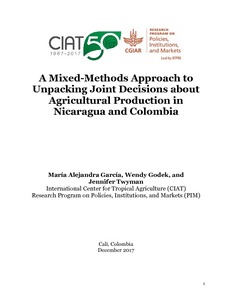A Mixed-Methods Approach to Unpacking Joint Decisions about Agricultural Production in Nicaragua and Colombia
Decision-making is a key element of frameworks to measure women’s empowerment. This document presents the method used by a recent study of household decision-making about agricultural production. More specifically, the study explored spousal accord and discord in agricultural decision-making, with a particular emphasis on joint decisions, by examining previously under-researched areas, such as perceptions and dynamics of household decision-making and legitimacy and bargaining power. The study had a twofold purpose of: 1) better informing agricultural researchers and other development researchers/practitioners about how households make agricultural decisions to aid in project and research design and 2) related to research design, to help researchers to better design instruments to measure household decision-making (e.g., surveys) that take into account findings about men and women’s perceptions about (joint) decision-making and their individual interpretations of questions related to decision-making. The study was conducted in two sites in Latin America, one in Nicaragua and the other in Colombia. It took a mixed-methods approach with a heavy emphasis on qualitative methods. Included in the report is a discussion of the methods used in detail, data collection instruments, and methodological strengths, limitations, and recommendations for the future.

